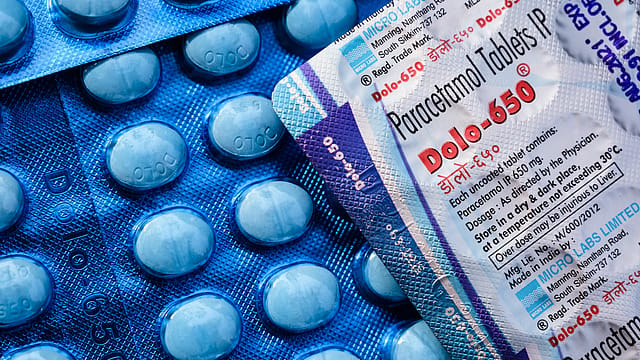DOLO freebies: SC asks Centre’s reply on price control mechanism
ADVERTISEMENT

The Supreme Court has asked the additional solicitor general K.M. Nataraj to file the government's response on a petition filed in the apex court with regards to the price control mechanism of drugs above 500 mg. During the hearing in the case on Thursday, senior advocate Sanjay Parikh and advocate Aparna Bhat, appearing for an NGO, the Federation of Medical & Sales Representatives Association of India (FMRAI), apprised the court of unethical practices of pharmaceutical companies and how they are avoiding the price control mechanism to make high profits.
During the hearing, senior advocate Sanjay Parikh cited an example in the court, saying drug maker Micro Labs, which manufactures the famous DOLO tablets, a fever and pain-reducing drug that became a household name during the Covid pandemic in India, distributed freebies worth ₹1,000 crore to doctors for prescribing its 650 mg dosage. The advocates informed the court that tablets up to 500 mg are regulated under the government's price control mechanism, while the price of drugs over 500 mg is set by pharma companies themselves.
Senior advocate Sanjay Parikh, while speaking to Fortune India, says many drug companies offer "freebies" to doctors so they prescribe their drugs to patients and that's how these pharma companies make a big buck. Saying that DOLO-650 was mentioned as an example in the Supreme Court while explaning the unethical marketing practices of pharmaceutical companies. "On each rupee invested by pharma companies, 20 paise is already set aside as fixed profit, while the rest of the cost goes to production and other costs," he says.
The SC bench comprising justices D.Y. Chandrachud and justice A.S. Bopanna termed the matter "serious", while seeking the Centre's response on the matter in the next 10 days. After that, the petitioner will file a rejoinder in one week and the matter will be heard next on September 29. "This is not music to ears. Even I was asked to have the same medicine when I had Covid. This is a serious matter," said Justice D.Y. Chandrachud.
The NGO plea sought the SC's directions to the Centre to make the Uniform Code of Pharmaceutical Marketing Practices (Code) statutory rather than voluntary.
Notably, on July 13, 2022, the Income Tax department carried out search and seizure operations on a major Bengaluru-based pharmaceutical group, engaged in the business of manufacturing and marketing pharmaceutical products and Active Pharmaceutical Ingredients (API). Though the department had not named the company, Micro Labs, the maker of the DOLO tablets, was linked to the raids in several reports published in the media.
The income tax department, during the course of the search operations, found substantial incriminating evidence, in the form of documents and digital data. The I-T department says the group has been debiting in its books of account “unallowable expenses” on account of “distribution of freebies” to the medical professionals under the head “sales and promotion”.
These freebies included travel expenses, perquisites and gifts etc., to doctors and medical professionals for promoting the group’s products under the heads “promotion and propaganda”, “seminars and symposiums”, “medical advisories”, etc. It said the group adopted "unethical practices" to promote its products and the quantum of such freebies is estimated to be around ₹1,000 crore.
The group is also found to have claimed artificially inflated deduction under special provisions in respect of certain incomes, by resorting to the suppression of expenses and over-appropriation of revenue to the unit eligible for such deduction. The I-T department said the quantum of tax sought to be evaded through such means is estimated at over ₹300 crore.